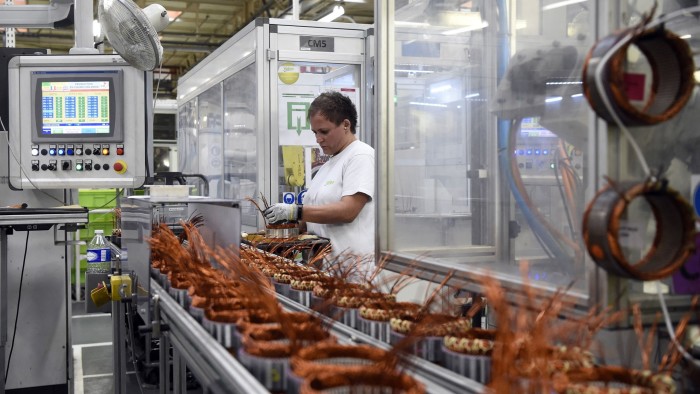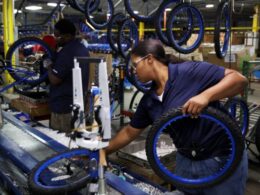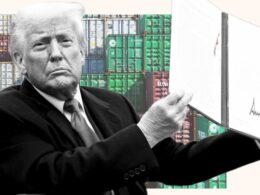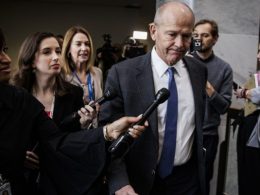Unlock the White House Watch newsletter for free
Your guide to what the 2024 US election means for Washington and the world
Global auto parts suppliers have entered a bruising pricing battle with carmakers as they seek to survive prohibitive tariffs that could wipe out thousands of smaller players from the $1tn industry.
The clash comes as car manufacturers are also holding crunch talks with Donald Trump to dissuade him from pushing ahead with 25 per cent tariffs on the majority of imported car parts from May 3.
The US president signalled on Monday that there would be “help” for the industry but details remain unclear on how the parts tariffs will be implemented.
Jean-Louis Pech, head of French trade body Fiev representing car parts suppliers, said its members were “bracing themselves for tough negotiations with carmakers who are also under pressure”, adding: “It’s going to be a terrible fight.”
French car parts supplier Valeo earlier this month said it had successfully agreed to pass on the extra costs from tariffs to half of its customers, but one global car company said it was standing firm against price increase requests from its 150 suppliers, among whom asked for a contractual pause known as “force majeure”.
“We’re not against each other, but we’re both in tough spots,” a senior executive at the car company said.
Executives warn that carmakers will probably resist attempts by many parts suppliers, already operating on thin margins below 5 per cent, to pass on the tariff costs amid concerns about a possible recession and sluggish vehicle demand.
Most parts supply contracts do not automatically allow car parts contractors to pass on costs to clients, with more than half of those surveyed by EU trade body Clepa and McKinsey saying they would have to renegotiate contracts to adapt to the tariffs.
In Europe, the industry had already been under severe financial pressure long before the trade war broke out due to slowing vehicle demand. Job losses more than doubled last year while several German suppliers, including seat producer Recaro and luxury car part maker Walter Klein, went bankrupt.
To support the industry, Pech called for Brussels to put in place more local content rules on car parts, subsidies for EV purchases and an investment programme akin to Joe Biden’s IRA.
“We risk losing half of the existing [French] industry if nothing is done in the next five years,” said Pech, adding that France had 56,000 jobs linked to car parts.
The impact of the tariff shock on the sector could be worse than during the pandemic, warn executives. The relationship between suppliers and their clients then became strained, as carmakers refused to fully absorb the soaring costs of securing components, especially semiconductors, which were in extremely short supply.
Most suppliers struggled with squeezed profit margins, while carmakers — especially premium brands such as Mercedes-Benz and BMW — raised prices and expanded their margins during the period.
“We can’t absorb the costs again,” one executive at a German supplier said.
“If things stay as they are now, [bankruptcies] will be part of the picture: suppliers can either absorb the cost or lose market share,” said Benjamin Krieger, Clepa’s secretary-general.
French car parts maker OPmobility has been hit by recent decisions by Stellantis and other carmakers to suspend production at sites such as Mexico and Canada to import cars to the US.
“When a client like Stellantis stops, we have no choice but to stop,” chief executive Laurent Favre said.
Compared with Europe, automotive experts say consolidation among Japan’s parts contractors has been held back by the corporate keiretsu network founded on cross-shareholdings with the likes of Toyota and Honda at the centre.
Toyota has informed suppliers that it will shoulder the extra cost of tariffs, according to two people familiar with the matter, although some parts suppliers question how long the group can continue providing the support.
Japanese auto parts suppliers are under pressure with bankruptcies hitting an 11-year high of 36 companies in 2024, according to data from Tokyo Shoko Research.
Hideki Takamiya, president of mobility solutions at Starlite, an Osaka-based grille supplier to Mazda, Nissan and Mitsubishi Motors, highlighted the fears rippling through supplier ranks.
He forecast a 10 per cent drop in sales from the tariffs on finished cars alone and a potential “double punch” from a stronger yen for Japanese exports.
“I want to say that we can turn this risk into an opportunity but there’s no opportunities here, just risks,” he said. “If we don’t strike new balanced partnerships between car and parts makers, then we won’t survive.”
Source link









